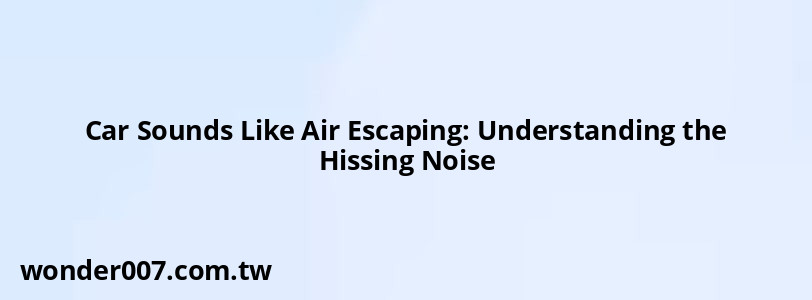Car Sounds Like Air Escaping: Understanding the Hissing Noise

When you turn off your car and hear a sound resembling air escaping, it can be concerning. This article aims to clarify the reasons behind this phenomenon, helping car owners understand whether it is normal or indicative of an issue.
Common Causes of Air Escaping Sounds
Hearing a hissing or air escaping sound after turning off your engine is often normal. Here are some common reasons for this noise:
- Vacuum Release: When the engine stops, the vacuum created during operation is released. This can cause a noticeable hiss as air rushes into the intake manifold to equalize pressure.
- Throttle Body Dynamics: The sound may originate from the throttle body. As the engine stops, air can be sucked in through the throttle body, producing a hissing noise that might be more pronounced with certain intake designs.
- Air Conditioning System: If your vehicle has been running the air conditioning, a pressure equalization may occur between the high and low sides of the AC system when you turn off the engine. This can create a brief hissing sound.
- Exhaust System: Sometimes, sounds can come from the exhaust system as residual pressure is released after shutting off the engine.
Is It Normal?
For most vehicles, these sounds are not a cause for concern. They are typical occurrences related to how automotive systems function. However, if you notice changes in performance or additional noises that seem unusual, it may be wise to consult a mechanic.
When to Seek Help
While many hissing sounds are normal, consider seeking professional advice if you experience any of the following:
- Persistent Noise: If the sound continues for an extended period after shutdown.
- Performance Issues: Any noticeable decrease in engine performance or efficiency.
- Check Engine Light: If warning lights appear on your dashboard alongside unusual sounds.
FAQs About Car Hissing Sounds
- What does it mean if my car hisses when I turn it off?
This typically indicates normal vacuum release or pressure equalization in various systems. - Should I be worried about hissing sounds?
Not usually; however, monitor for any performance changes or persistent noises. - Can aftermarket parts affect these sounds?
Yes, aftermarket intakes may amplify sounds compared to OEM parts.
Understanding these common causes and knowing when to seek help can enhance your confidence in managing your vehicle's health.
Related Posts
-
Battery Warning Light: Understanding Its Significance
29-01-2025 • 249 views -
P0014 Code: Understanding and Fixing Your Hyundai Sonata
26-01-2025 • 178 views -
Volkswagen DTC P0236: Understanding Turbocharger Issues
26-01-2025 • 251 views -
Hissing Noise When Turning Steering Wheel: Causes & Fixes
30-01-2025 • 203 views -
Steering Column Noise: Troubleshooting the 2012 Toyota Camry
27-01-2025 • 182 views
Latest Posts
-
Rear Brake Caliper Piston Won't Compress
01-02-2025 • 361 views -
2015 Chevy Traverse AC Recharge Port Location
01-02-2025 • 418 views -
How To Turn Off Paddle Shifters Mercedes
01-02-2025 • 387 views -
Are O2 Sensors Covered Under Warranty
01-02-2025 • 378 views -
Power Steering Fluid Leak On Passenger Side
01-02-2025 • 461 views
Popular Posts
-
EPC Light: Understanding Causes and Solutions
26-01-2025 • 1065 views -
V12 Engine Costs: What You Need to Know
26-01-2025 • 688 views -
Hino Warning Lights: Understanding Dashboard Alerts
26-01-2025 • 794 views -
Toyota Hiace: Fuel Efficiency Insights for 2025
26-01-2025 • 645 views -
Power Steering and ABS Light On: Causes and Solutions
27-01-2025 • 649 views
